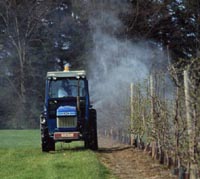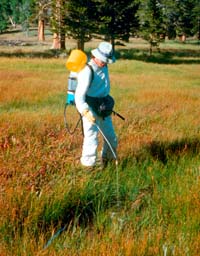Rotenone
as an insecticide
Rotenone is one of seven naturally occurring
chemicals permitted for occasional restricted use in organic farming. It is generally used to control aphids as well as
the raspberry beetle and sawflies. However, it is rarely used as
it can have an adverse effect on beneficial species as well as pests.
Unlike modern, synthetic pesticides it breaks down easily and quickly and
so was thought to pose little danger. It is also used as a garden
dust to control insects and rotenone-based pesticides are on sale across
Britain.
organic farming. It is generally used to control aphids as well as
the raspberry beetle and sawflies. However, it is rarely used as
it can have an adverse effect on beneficial species as well as pests.
Unlike modern, synthetic pesticides it breaks down easily and quickly and
so was thought to pose little danger. It is also used as a garden
dust to control insects and rotenone-based pesticides are on sale across
Britain.
Rotenone is also on sale as an insecticide shampoo
for dogs, cattle and sheep, which is used to kill lice.
 Another
use of rotenone is to kill fish parasites. This must only be done
using very small doses, as rotenone is also toxic to fish. In October
2000, rotenone was used in a fjord in Western Norway to kill cod parasites.
It was used in small enough quantities so as to kill the parasites while
allowing the cod to survive. Rotenone has also been used in Norwegian
rivers in attempts to eradicate the salmon parasite gyrodactylus.
Another
use of rotenone is to kill fish parasites. This must only be done
using very small doses, as rotenone is also toxic to fish. In October
2000, rotenone was used in a fjord in Western Norway to kill cod parasites.
It was used in small enough quantities so as to kill the parasites while
allowing the cod to survive. Rotenone has also been used in Norwegian
rivers in attempts to eradicate the salmon parasite gyrodactylus.
The mechanism of action of rotenone is similar
for both insects and fish and it is outlined on the page describing the
use of rotenone as a piscicide.
 organic farming. It is generally used to control aphids as well as
the raspberry beetle and sawflies. However, it is rarely used as
it can have an adverse effect on beneficial species as well as pests.
Unlike modern, synthetic pesticides it breaks down easily and quickly and
so was thought to pose little danger. It is also used as a garden
dust to control insects and rotenone-based pesticides are on sale across
Britain.
organic farming. It is generally used to control aphids as well as
the raspberry beetle and sawflies. However, it is rarely used as
it can have an adverse effect on beneficial species as well as pests.
Unlike modern, synthetic pesticides it breaks down easily and quickly and
so was thought to pose little danger. It is also used as a garden
dust to control insects and rotenone-based pesticides are on sale across
Britain. Another
use of rotenone is to kill fish parasites. This must only be done
using very small doses, as rotenone is also toxic to fish. In October
2000, rotenone was used in a fjord in Western Norway to kill cod parasites.
It was used in small enough quantities so as to kill the parasites while
allowing the cod to survive. Rotenone has also been used in Norwegian
rivers in attempts to eradicate the salmon parasite gyrodactylus.
Another
use of rotenone is to kill fish parasites. This must only be done
using very small doses, as rotenone is also toxic to fish. In October
2000, rotenone was used in a fjord in Western Norway to kill cod parasites.
It was used in small enough quantities so as to kill the parasites while
allowing the cod to survive. Rotenone has also been used in Norwegian
rivers in attempts to eradicate the salmon parasite gyrodactylus.